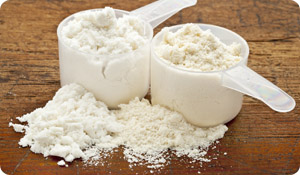
Do you remember Dippin Dots, the pearl-shaped dessert product that advertised itself as "The Ice-Cream of the Future"? Well, another food invention, created by 25-year-old entrepreneur Robert Rhinehart, is claiming to be the fare of the future—a food to replace all other foods. Soylent, a total meal replacement product, was invented by Rhinehart to minimize the amount of time and money it takes to create a nutritionally balanced meal. According to Rhinehart, "The body doesn't need food itself, merely the chemicals and elements it contains." Based on this theory, Rhinehart set out to create a nutritionally dense product that was cost and time effective, but still provides the same, if not more, sustenance than your three squares would.
Rhinehart claims an individual can live on the product exclusively; however, he told the UK's The Guardian he "expects most customers to use it for 50-80 percent of their meals." In a recent appearance on The Colbert Report, the Soylent creator stated that, for the last year and a half, 90 percent of his own food consumption has been Soylent.
The Value
Soylent comes as a dry powder that is meant to be mixed with water and the brand’s oil blend, which is comprised of canola and fish oils.
Ingredients include maltodextrin (a carbohydrate), rice protein, and oat flour, as well as a multitude of essential vitamins and minerals. Each packet of Soylent contains 510 calories, 5 grams of fat, 84 grams of carbohydrate, and 38 grams of protein. While some of these numbers may seem high, it’s important to understand that the Food and Drug Administration (FDA) classifies Soylent as a food, not a supplement; it’s meant to replace your meal of steak dinner, potatoes, and a side salad.
Soylent’s website states that living on the product will not only save you time on food preparation, but it will cost less than $10 per day, or under $4 per meal.
What the Experts Say
In a word, not a lot. Soylent is a new product and there is little to no scientific data to support or refute the claims made by Rhinehart and his company. The touted benefits, and the criticisms, of the product are largely anecdotal.
In fact, one of the biggest criticisms of Rhinehart is that he has no background in nutritional or health sciences. In a piece written for The Daily Beast, Russell Saunders, a pseudonym used by a pediatrician based in New England, comments that "[he shares] the concerns of many unconvinced scientists that Rinehart is kind of making this up as he goes along, and doesn’t really know what he’s doing."
Considering Soylent?
If you’re thinking about making a change to your diet as drastic as moving to an all-liquid plan, be sure to consult a physician. Trying to improve your health is a good thing. Doing so without consulting the experts is not.
Sources
Gabbatt, Adam. "My week on Soylent: 'I Was Irritable, Grumpy and a General Pain in the Arse.'" The Guardian. May 30, 2014.
Gaither, Tanita. "Soylent: The Debatable Future of Food and Food Hacking." Eye Witness News 3. Page updated June 13, 2014.
Saunders, Russell. "Doc Says No to Soylent." The Daily Beast. May 13, 2014.
"About." Soylent. Page accessed July 22, 2014.
"Nutrition Facts." Soylent. Page accessed July 22, 20 14.





